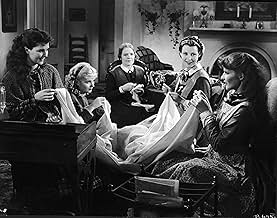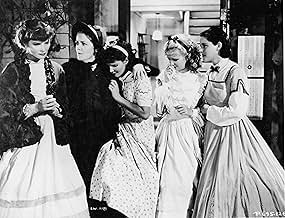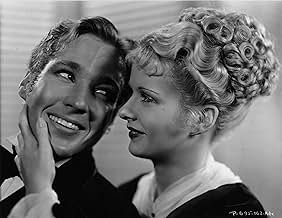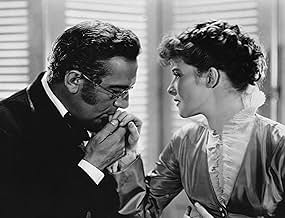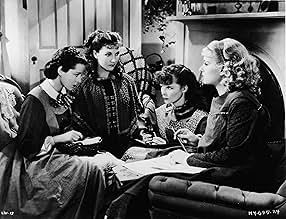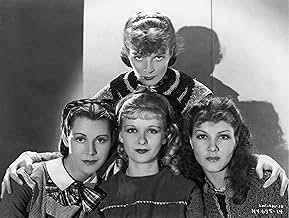IMDb रेटिंग
7.2/10
8.3 हज़ार
आपकी रेटिंग
अपनी भाषा में प्लॉट जोड़ेंA chronicle of the lives of sisters growing up in 19th-century New England.A chronicle of the lives of sisters growing up in 19th-century New England.A chronicle of the lives of sisters growing up in 19th-century New England.
- 1 ऑस्कर जीते
- 7 जीत और कुल 4 नामांकन
John Lodge
- Brooke
- (as John Davis Lodge)
Samuel S. Hinds
- Mr. March
- (as Samuel Hinds)
Nina Borget
- Housekeeper
- (बिना क्रेडिट के)
Francesca Braggiotti
- Dance Teacher
- (बिना क्रेडिट के)
Luke Cosgrave
- Old Man
- (बिना क्रेडिट के)
फ़ीचर्ड समीक्षाएं
I will always have a soft spot for this film, and to me it is the best version of the three versions I've seen so far of Little Women(1994 and 1949 were the others, and I liked both of them very much). The sound here is a little too tinny, and the Laurie of Douglass Montgommery is too fey for my tastes. However, it still looks beautiful, the costumes and hairstyles are well suited to the period, the sets are sumptuous and the film is very handsomely shot. There is also a stirring score from Max Steiner, making it sound appropriately nostalgic, the script is faithful and warm-toned, it is directed with great taste by George Cukor and the story has all the warmth and poignancy of the book, which is one of my favourites of all time. Apart from Montgommery I loved the acting, Edna May Oliver here does what she did best, more than convincingly play sharp-tongued spinsters, and Henry Stephenson is a dear Mr Laurence. Paul Lukas is an unexceptional but romantic Professor Bhaer, an improvement on the wooden and too-Italianate Rosanno Brazzi in the 1949 film, and Spring Byington a Marmee of real sincerity. The four March girls Meg, Jo, Beth and Amy(aka the Little Women of the title) are what drive the story, and all four really shone here. Joan Bennett is appealing as Amy and leaves room for character growth from a vain little girl to an elegant young lady. Jean Parker is a very sweet and moving Beth, and Frances Dee is beautiful as Meg should be. Best of all is the Jo of Katharine Hepburn, who is perfectly cast in a role she was born to play. All in all, truly lovely and the best version to me. 9/10 Bethany Cox
This satisfying movie adaptation of "Little Women" features a strong cast and a production that was quite solid for 1933. While a glance at the story outline might give the impression that it is simplistic or childlike, that is far from the case. The novel offers well-defined characters and many situations that bring out worthwhile insights into the characters and into life in general. While neither this nor the other movie versions of the story have the same thematic depth, this version effectively presents enough of the material in a thoughtful and entertaining way.
Katherine Hepburn heads the cast, and gives plenty of life to Jo. Naturally she gets the main focus, but the other sisters and the secondary characters also get some good moments, and most of them get a chance to steal a scene or two. Henry Stephenson and Douglas Montgomery get a number of good scenes as the March family's neighbors. Edna May Oliver is well cast, and it's only too bad that she did not get a couple more scenes. Paul Lukas makes Professor Baer come alive. By no means least are Jean Parker, Frances Dee, and Joan Bennett as Beth, Meg, and Amy.
It is often easy to tell when the movie was made, most especially because of the sound. But actually the production is better technically and artistically than are most movies of the early 1930s. Several of the sets are particularly well done, creating just the right atmosphere for their scenes. Director George Cukor puts it all together nicely.
This is the kind of movie that is generally out of style at present, because it lacks the kind of self-indulgent material and the self-absorbed style that so unduly impress many of today's movie fans. But the only genuine weakness is that it has a few technical limitations, most of which are common to many films of its era.
What this adaptation does offer is a sympathetic and sometimes insightful look at the lives of some ordinary but strong persons, who are brought to life by a good cast and a director who seemed himself to care about the characters.
Katherine Hepburn heads the cast, and gives plenty of life to Jo. Naturally she gets the main focus, but the other sisters and the secondary characters also get some good moments, and most of them get a chance to steal a scene or two. Henry Stephenson and Douglas Montgomery get a number of good scenes as the March family's neighbors. Edna May Oliver is well cast, and it's only too bad that she did not get a couple more scenes. Paul Lukas makes Professor Baer come alive. By no means least are Jean Parker, Frances Dee, and Joan Bennett as Beth, Meg, and Amy.
It is often easy to tell when the movie was made, most especially because of the sound. But actually the production is better technically and artistically than are most movies of the early 1930s. Several of the sets are particularly well done, creating just the right atmosphere for their scenes. Director George Cukor puts it all together nicely.
This is the kind of movie that is generally out of style at present, because it lacks the kind of self-indulgent material and the self-absorbed style that so unduly impress many of today's movie fans. But the only genuine weakness is that it has a few technical limitations, most of which are common to many films of its era.
What this adaptation does offer is a sympathetic and sometimes insightful look at the lives of some ordinary but strong persons, who are brought to life by a good cast and a director who seemed himself to care about the characters.
LITTLE WOMEN is quite possibly the one book written post-Shakespeare that has the most number of film adaptations to its credit. Louisa May Alcott's novel, after all, offers a fine host of roles, particularly for women--of the March girls alone, there's the eldest sister Meg; the frail but saintly Beth; spoilt baby of the family Amy; and last but most certainly not least, spunky tomboy Jo. (This is not to forget the smaller, but still integral, supporting roles of Laurie, Mr Lawrence, Professor Bhaer, and of course, Marmee March.) The story is an engaging one too, following the lives of the March sisters--in particular Jo--as they grow and deal with change, with love, and even with death. Even though the story itself is tied to a particular setting in the 1860s (and even then the historical setting is almost peripheral), the characters and their relationships with one another--siblings, parent/children, friends and lovers--are simply timeless. That's probably why the novel has seen as many attempts to have it committed to film as it has.
I hate to make a snap judgement, having not seen any more versions of Little Women than the 1994 one, but I believe that this version, made by RKO studios and starring a delightful Katharine Hepburn as Jo March, has every right to be considered the definitive film version of the Alcott novel. The writing, for one thing, is exceptional. Although never quite the novel's substitute, it condenses the book marvellously, sketching the characters and relationships of the girls quickly and efficiently, and never skipping over the best parts of the book (for example, Laurie's profession of love for Jo). Of course the screenplay will never measure up to the book--it is rare that a film could surpass the wealth of detail and beauty of description available from the written word. But nothing's perfect, and this screenplay, by Sarah Y. Mason and Victor Heerman, is as close as an adaptation can get while retaining its own distinct flavour as a film.
As for the casting, I have very few complaints about it, since Hepburn--all angles and attitude, all loud-voiced and tomboyish--is perfect as Jo and is ably supported by Frances Dee as Meg, Henry Stephenson as the sweetly paternal Mr. Laurence and Douglass Montgomery as Laurie (though he plays the role a tad too fey for my liking). Special praise must be reserved for both Jean Parker (Beth March) and Paul Lukas (Professor Fritz Bhaer): Parker for bringing an impossibly sweet and lovely character to life, and making the audience genuinely grieve for Beth when she takes her leave of her family; Lukas for managing to avoid making Professor Bhaer a hard, frightening man with whom the audience simply cannot imagine Jo being in love (as is *my* impression from the book). I was rather disappointed with Joan Bennett as Amy, and that is of course partly attributable to the fact that the character isn't particularly sympathetic in the novel either, so it isn't really fair to expect a miracle from Bennett. Still, Bennett seemed to me to be the most lifeless of the sisters--one might think this an unfair judgement, since anyone acting opposite the powder keg that is Katharine Hepburn could easily be deemed lifeless if he or she weren't able to hold his/her own against her. Still, the arguably less well-known Frances Dee and Jean Parker had no problem with it.
In the final analysis though, there is no doubt that this film, however 'ensemble' the cast, belongs only to Hepburn. Her performance, although somewhat mannered and brassy at times (not necessarily simultaneously, thank goodness!), is nothing short of brilliant. She's sad, she's funny, she's touching, and as she does in her best roles, she transcends her own (pretty formidable!) character to breathe life into Jo as only she can. Witness the simple scene in which Jo breaks down, alone, at night, after having sold her hair for her mother's travel expenses... or the scene when Jo truly believes that scarlet fever is going to take Beth from her, and she trudges up into her own attic, the weight of the world on her shoulders, and collapses into tears. There is also nothing more charming than Hepburn as she gallops down the stairs in a frock which she burnt by leaning against the fireplace, or when she runs like a free, untamed spirit through the woods when chased by Laurie. Strange, sweet, funny Jo--this complex combination of jealous child and strong woman, stubbornly refusing to relinquish the familiar while adamantly placing her family above her own interests always... it really is a role that seems to have been written for Hepburn, just as she seems to have been born to play it. It is perhaps for LITTLE WOMEN as much as for MORNING GLORY (released in the same year) that Hepburn won her first Oscar in 1933. Nobody photographs Hepburn as flatteringly as her good friend and director George Cukor either, so some of the close-up shots of her in LITTLE WOMEN are simply breathtaking in having managed to capture her beauty, her youth and her personality all at once.
Nothing about this film is perfect; after all, perfection is too high a standard to be applied to adaptations (and most other films!). But LITTLE WOMEN really does have a little something to offer everybody--a sweet, timeless story about love and growing up and family. It's something that everyone can relate to, and that's probably more than enough.
I hate to make a snap judgement, having not seen any more versions of Little Women than the 1994 one, but I believe that this version, made by RKO studios and starring a delightful Katharine Hepburn as Jo March, has every right to be considered the definitive film version of the Alcott novel. The writing, for one thing, is exceptional. Although never quite the novel's substitute, it condenses the book marvellously, sketching the characters and relationships of the girls quickly and efficiently, and never skipping over the best parts of the book (for example, Laurie's profession of love for Jo). Of course the screenplay will never measure up to the book--it is rare that a film could surpass the wealth of detail and beauty of description available from the written word. But nothing's perfect, and this screenplay, by Sarah Y. Mason and Victor Heerman, is as close as an adaptation can get while retaining its own distinct flavour as a film.
As for the casting, I have very few complaints about it, since Hepburn--all angles and attitude, all loud-voiced and tomboyish--is perfect as Jo and is ably supported by Frances Dee as Meg, Henry Stephenson as the sweetly paternal Mr. Laurence and Douglass Montgomery as Laurie (though he plays the role a tad too fey for my liking). Special praise must be reserved for both Jean Parker (Beth March) and Paul Lukas (Professor Fritz Bhaer): Parker for bringing an impossibly sweet and lovely character to life, and making the audience genuinely grieve for Beth when she takes her leave of her family; Lukas for managing to avoid making Professor Bhaer a hard, frightening man with whom the audience simply cannot imagine Jo being in love (as is *my* impression from the book). I was rather disappointed with Joan Bennett as Amy, and that is of course partly attributable to the fact that the character isn't particularly sympathetic in the novel either, so it isn't really fair to expect a miracle from Bennett. Still, Bennett seemed to me to be the most lifeless of the sisters--one might think this an unfair judgement, since anyone acting opposite the powder keg that is Katharine Hepburn could easily be deemed lifeless if he or she weren't able to hold his/her own against her. Still, the arguably less well-known Frances Dee and Jean Parker had no problem with it.
In the final analysis though, there is no doubt that this film, however 'ensemble' the cast, belongs only to Hepburn. Her performance, although somewhat mannered and brassy at times (not necessarily simultaneously, thank goodness!), is nothing short of brilliant. She's sad, she's funny, she's touching, and as she does in her best roles, she transcends her own (pretty formidable!) character to breathe life into Jo as only she can. Witness the simple scene in which Jo breaks down, alone, at night, after having sold her hair for her mother's travel expenses... or the scene when Jo truly believes that scarlet fever is going to take Beth from her, and she trudges up into her own attic, the weight of the world on her shoulders, and collapses into tears. There is also nothing more charming than Hepburn as she gallops down the stairs in a frock which she burnt by leaning against the fireplace, or when she runs like a free, untamed spirit through the woods when chased by Laurie. Strange, sweet, funny Jo--this complex combination of jealous child and strong woman, stubbornly refusing to relinquish the familiar while adamantly placing her family above her own interests always... it really is a role that seems to have been written for Hepburn, just as she seems to have been born to play it. It is perhaps for LITTLE WOMEN as much as for MORNING GLORY (released in the same year) that Hepburn won her first Oscar in 1933. Nobody photographs Hepburn as flatteringly as her good friend and director George Cukor either, so some of the close-up shots of her in LITTLE WOMEN are simply breathtaking in having managed to capture her beauty, her youth and her personality all at once.
Nothing about this film is perfect; after all, perfection is too high a standard to be applied to adaptations (and most other films!). But LITTLE WOMEN really does have a little something to offer everybody--a sweet, timeless story about love and growing up and family. It's something that everyone can relate to, and that's probably more than enough.
The film might be more accurately titled "Little Woman", with Katherine Hepburn seizing the lead role, and never letting go. Otherwise, it's the story of four "Little Women" growing up, and finding love's direction. Hepburn (she's Jo) is sister to Joan Bennett (she's Amy), Jean Parker (she's Beth), and Frances Dee (she's Meg). Of their suitors, Douglass Montgomery (he's Laurie) gets the most action.
Ms. Bennett steals the actual acting honors with a performance that is natural and consistent; her voice and mannerisms are appropriately girlish, young womanish and, selfish. Ms. Hepburn plays girlish like she's had too many cups of coffee; additionally, she never looks even remotely "tomboyish"; looking, instead, like a ravishingly made-up MGM movie star. Ms. Parker rises out of her sick bed like a zombie, but is okay in other scenes.
Watching Hepburn being romanced by Mr. Montgomery and Paul Lukas is unnerving. The story does have some reasons to watch, however. The production is obviously top-of-the-line. Hepburn may not be in her best role, but it's not awful; she slows down and gets better after her character grows older. The script has well-written characters - Jo, Amy, and Laurie - who illustrate a sweet story of family, love, and friendship.
******* Little Women (11/16/33) George Cukor ~ Katharine Hepburn, Joan Bennett, Douglass Montgomery, Paul Lukas
Ms. Bennett steals the actual acting honors with a performance that is natural and consistent; her voice and mannerisms are appropriately girlish, young womanish and, selfish. Ms. Hepburn plays girlish like she's had too many cups of coffee; additionally, she never looks even remotely "tomboyish"; looking, instead, like a ravishingly made-up MGM movie star. Ms. Parker rises out of her sick bed like a zombie, but is okay in other scenes.
Watching Hepburn being romanced by Mr. Montgomery and Paul Lukas is unnerving. The story does have some reasons to watch, however. The production is obviously top-of-the-line. Hepburn may not be in her best role, but it's not awful; she slows down and gets better after her character grows older. The script has well-written characters - Jo, Amy, and Laurie - who illustrate a sweet story of family, love, and friendship.
******* Little Women (11/16/33) George Cukor ~ Katharine Hepburn, Joan Bennett, Douglass Montgomery, Paul Lukas
Few would deny the powerful presence of Katherine Hepburn in any movie she ever made. In this first screen adaptation with sound of Louisa May Alcott's famous novel, Hepburn IS the movie. That is to say, her part, her lines, her camera time seem to surpass the combined times of all the rest of the cast. While that may be as one would expect for many stories – a star or hero being the focal point of a whole work, this film, based on this book, was supposed to be about several "little women." So, most of the rest of the characters in the film – save a neighbor male friend, really get short shrift. For that reason, and a few others I'll mention, I think this rendition falls short of the interesting story told in the book.
I would like to have seen more development of the sisters than this film has. The later remake – 1949's MGM production, does flesh out all the characters more. The problem with the overly heavy emphasis on the one character in this first movie is that the audience doesn't get much of a sense of who are the rest of the members of the family. So we can't so readily experience the ups and downs, the emotions, the tragedy and love felt between the sisters and their mother.
Hepburn does a very good Jo, but not great. I think her efforts to be the tomboy were overdone in a few instances, which only drew my attention to this aspect of her role. She didn't seem to come by it naturally. One example was when she spoke a couple of times, acting and deliberately mimicking a deep-throated guttural voice for a man. At other times, she seemed to push it a bit and overact in flamboyance of tom-boyish behavior.
There were no other notable performances by other cast members. Paul Lukas as Professor Bhaer and Douglas Montgomery as Laurie were good. Most of the rest were just OK or non-descript. One member was just not right for the role of Marmee. Spring Byington brought no depth or real feel to the role that the viewer could sense. But, then, the film just seemed to glide over the lesser roles.
"Little Women" is a good story in the American library, and this film is enjoyable to watch. But, for a much more involving and endearing film, be sure to see the 1949 rendition by MGM.
I would like to have seen more development of the sisters than this film has. The later remake – 1949's MGM production, does flesh out all the characters more. The problem with the overly heavy emphasis on the one character in this first movie is that the audience doesn't get much of a sense of who are the rest of the members of the family. So we can't so readily experience the ups and downs, the emotions, the tragedy and love felt between the sisters and their mother.
Hepburn does a very good Jo, but not great. I think her efforts to be the tomboy were overdone in a few instances, which only drew my attention to this aspect of her role. She didn't seem to come by it naturally. One example was when she spoke a couple of times, acting and deliberately mimicking a deep-throated guttural voice for a man. At other times, she seemed to push it a bit and overact in flamboyance of tom-boyish behavior.
There were no other notable performances by other cast members. Paul Lukas as Professor Bhaer and Douglas Montgomery as Laurie were good. Most of the rest were just OK or non-descript. One member was just not right for the role of Marmee. Spring Byington brought no depth or real feel to the role that the viewer could sense. But, then, the film just seemed to glide over the lesser roles.
"Little Women" is a good story in the American library, and this film is enjoyable to watch. But, for a much more involving and endearing film, be sure to see the 1949 rendition by MGM.
क्या आपको पता है
- ट्रिवियाKatharine Hepburn asked costume designer Walter Plunkett to copy a dress her maternal grandmother wore in a tintype photograph.
- गूफ़In the Christmas play when the prop tower falls down, Jo's lips aren't moving when she says "Everything is all right."
- भाव
Beth March: You're old enough now to leave off boyish tricks and behave better, Josephine. Now you are so tall and turn up your hair, you must remember you're a young lady.
Jo March: No, l'm not. And if turning up my hair makes me so, l'll wear it down till l'm a hundred!
- क्रेज़ी क्रेडिटPaul Lukas as Professor Bher is not listed in the closing credits.
- इसके अलावा अन्य वर्जनOlder video and television prints remove the original RKO logo in the opening and replace it with the one from Selznick International.
- कनेक्शनFeatured in David O. Selznick: 'Your New Producer' (1935)
- साउंडट्रैकThe Girl I Left Behind Me
(uncredited)
Traditional
Played during the opening scene
टॉप पसंद
रेटिंग देने के लिए साइन-इन करें और वैयक्तिकृत सुझावों के लिए वॉचलिस्ट करें
- How long is Little Women?Alexa द्वारा संचालित
- What is 'Little Women' about?
- Is "Little Women" based on a book?
- How old are the March sisters at the start of story?
विवरण
- रिलीज़ की तारीख़
- कंट्री ऑफ़ ओरिजिन
- भाषाएं
- इस रूप में भी जाना जाता है
- Las cuatro hermanitas
- फ़िल्माने की जगहें
- Providencia Ranch, Hollywood Hills, लॉस एंजेल्स, कैलिफोर्निया, संयुक्त राज्य अमेरिका(exterior of March house)
- उत्पादन कंपनी
- IMDbPro पर और कंपनी क्रेडिट देखें
बॉक्स ऑफ़िस
- बजट
- $4,24,000(अनुमानित)
- चलने की अवधि1 घंटा 55 मिनट
- पक्ष अनुपात
- 1.37 : 1
इस पेज में योगदान दें
किसी बदलाव का सुझाव दें या अनुपलब्ध कॉन्टेंट जोड़ें



